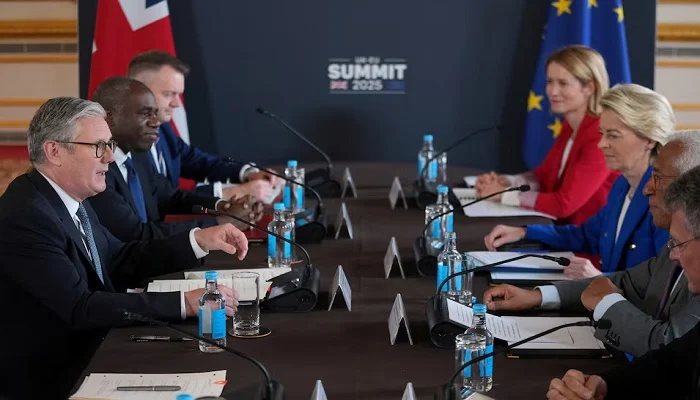Britain agreed on Monday to the most significant reset of its defence and trade ties with the European Union since Brexit, as US President Donald Trump’s disruption of the global order compelled both sides to move beyond their acrimonious separation.
Nearly nine years after voting to leave the bloc, Britain, Europe’s second-largest defence spender, will participate in joint procurement projects. The parties also agreed to facilitate easier access to the EU for UK food products and visitors and signed a contentious new fishing agreement.
Trump’s tariffs, coupled with warnings that Europe should enhance its self-defence capabilities, prompted governments worldwide to reassess trade, defence, and security relationships, bringing British Prime Minister Keir Starmer closer to France’s Emmanuel Macron and other European leaders.
Starmer, who supported remaining in the EU during the Brexit referendum, also gambled that offering benefits to Britons, such as expedited e-gate access at EU airports, would overshadow the “betrayal” accusations from Brexit campaigner Nigel Farage.
Flanked by EU Commission President Ursula von der Leyen and European Council President Antonio Costa, Starmer declared the deal marked “a new era in our relationship.”
Von der Leyen stated that it sent a message to the world: “At a time of global instability, and when our continent faces the greatest threat it has for generations, we in Europe stick together.”
Britain stated that the recalibration with its largest trading partner would reduce bureaucracy for food and agricultural producers, leading to cheaper food, enhancing energy security, and adding nearly £9 billion ($12.1 billion) to the economy by 2040.
This marks the third deal Britain has secured this month, following agreements with India and the US. While an immediate economic surge is unlikely, it could boost business confidence, attracting much-needed investment.
Central to the reset is a defence and security pact allowing Britain to participate in joint procurement and paving the way for British companies, including BAE, Rolls-Royce, and Babcock, to engage in a 150 billion euro ($167 billion) programme to rearm Europe.
Regarding fishing, British and EU vessels will have access to each other’s waters for 12 years—ceding one of the UK’s strongest negotiating positions for future talks—in exchange for a permanent reduction in paperwork and border checks that had hindered small food producers from exporting to Europe.
In return, Britain has agreed to the outline of a limited youth mobility scheme, with details to be finalized later, and is discussing participation in the Erasmus+ student exchange programme.
The agreement was condemned by Farage and the opposition Conservative Party, which was in power when Britain left the bloc and spent years negotiating the original withdrawal agreement.
Historic referendum Britain’s vote to leave the EU in the historic 2016 referendum revealed a nation deeply divided on issues ranging from migration and sovereignty to culture and trade.
It contributed to one of the most turbulent periods in British political history, with five prime ministers serving before Starmer took office last July, and strained relations with Brussels.
Polls now indicate that a majority of Britons regret the vote, although they do not wish to rejoin. Farage, who campaigned for Brexit for decades, leads opinion polls in Britain, limiting Starmer’s room for manoeuvre.
However, collaboration between Britain and European powers on Ukraine and regarding Trump has rebuilt trust between the two sides after years of strained relations.
Rather than seeking a full return to an EU pillar like the single market, Starmer aimed to negotiate improved market access in specific areas—a move often rejected by the EU as “cherry-picking” EU benefits without the obligations of membership.
Reducing red tape on food trade required Britain to accept EU oversight on standards, but Starmer will argue that the economic growth and lower food prices justify this. Trade experts noted that breaking the taboo of EU oversight for benefits to small companies and farmers was politically astute.
Despite the agreement, Britain’s economy will remain significantly different from its pre-Brexit state. Studies indicate that Brexit cost London’s financial centre thousands of jobs, has negatively impacted the sector’s output, and reduced its tax contributions.



